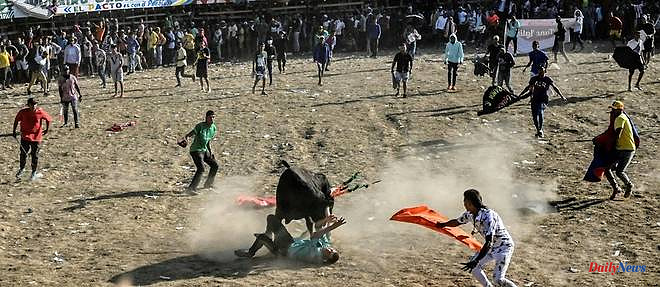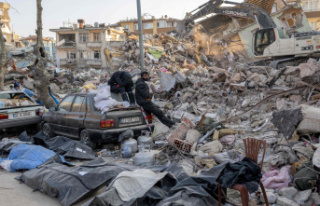The bull charges in all directions, sowing chaos among hundreds of amateur bullfighters, to the cheers of feverish spectators. At the beginning of each year, the "corralejas", a bullfighting game where amateur matadors are allowed to descend into the arena, ignites the Colombian Caribbean.
A brutal fight, often bloody, and deeply rooted in Colombian culture, but in the crosshairs of environmental parliamentarians and the new majority on the left.
The hero of the day is called Eliecer Molina. This tall fellow in a straw hat is acclaimed in the stands, where he comes to collect a few pesos for his exploits. A makeshift bandage covers his left eye, seriously injured by a gash.
This brave 37-year-old bullfighter usually lives off "odd jobs", he explains. "I miscalculated" the distance, he comments about his injury.
Corralejas are a direct legacy of Spanish colonization. But much more popular and informal than the classic bullfights organized in big cities like Cali or Medellin.
The bull does not die there, while the public is invited to come and measure up to the beast in the arena.
AFP attended one of these bullfighting shows in Guaranda, in the department of Sucre (north).
In an amphitheater set up for the occasion, 58 bulls were exhibited, loaned by wealthy breeders, to the delight of the inhabitants of this city of 15,600 inhabitants.
For pleasure and "out of necessity, I had this life", says Ricardo Rodriguez, a worker gored that evening in the right leg, with 36 stitches as a bonus. He is one of the "banderilleros" running behind the bull to plant colored steel rods on his back. Others have fun fighting cattle with hats or umbrellas.
The construction of the arena took 12 days. It will be dismantled and rebuilt in another city. And so on, like a Colombian-style Pinder circus.
A shot of gunpowder announces the entry of the bulls.
One by one, and in shifts of about ten minutes, they furiously enter the arena, splitting the panicked crowd.
Most of the amateur bullfighters decamp and scurry off into the bleachers. A few fearlessly face the beasts with menacing horns. Horsemen also come to sting them.
In the stands, food vendors are everywhere. Spectators are lying in hammocks. Alcohol flows freely, to the sound of brass bands.
The Guaranda corralejas will continue for nearly a week, under the patronage of local politicians who pay to have their names on the arena of nearly 3,000 people.
In Colombia as elsewhere, the fight against animal suffering obliges, the debate has raged in recent years on the banning of bullfights and other "cruel animal shows".
The coming to power of left-wing president Gustavo Petro, an assumed anti-bullfighting, could well accelerate prohibition.
Last June, he called for "no longer allowing shows resulting in the death of animals or people", after the death of six people in the collapse of a stand in a corraleja bullring.
A bill, supported by environmentalists, is currently under consideration in Congress. Very popular, the corralejas are a more sensitive subject than the classic bullfights.
Originally, the bill targeted bullfighting, cockfighting and corralejas. But the latter have been dismissed by some parliamentarians who consider this tradition to be too deeply rooted in the country's culture.
For the animalist senator Andrea Padilla, at the origin of this project, the corralejas are only "violence exerted on sentient beings", a tradition "falling into disuse", she assures the AFP, castigating the new "circus games" Roman "for the entertainment of a few elites".
The senator now intends that the use of sharp instruments, the entry of minors and the sale of alcohol be regulated in the corralejas.
There are no official figures of deaths or injuries during these festivals, by the bulls or in the frequent collapse of bleachers. In 1980, nearly 500 people died when an arena collapsed.
In Latin America, bullfighting is now banned in Brazil, Argentina, Uruguay, Chile and Guatemala. Costa Rica has its corralejas, but during which the bulls are not harmed.
In Guaranda, we are of course worried about these initiatives which could put an end to the party. For Dionisio Suarez, one of the organizers, the corralejas are like "a tradition" which "feels, which is lived", and which "goes to the blood".
If the most anticipated event of the year is banned, "people will starve", he further assures, while the region's economy is also based on livestock.
Pedro Chaves, 57, has fun with his two grandchildren, aged eight and two. "We have to instill in them the same culture as ours (...) it is transmitted from generation to generation". "We must also take advantage of the last moments" of the corralejas, he predicts.
02/13/2023 13:48:00 - Guaranda (Colombie) (AFP) - © 2023 AFP












